It’s a good life to be an event photographer. It’s hard work and it’s a lot of weekend work, but it’s a good life. You get to meet good people. There’s nothing better than going to a gig and the music is good. You enjoy the music. The food is good. And then it feels like fun. It is fun… most of it.
There are challenges, too, of course. Dealing with obnoxious party guests, navigating challenging lighting conditions, ignoring the inevitable self-doubt, being in the right place at the right time – literally.
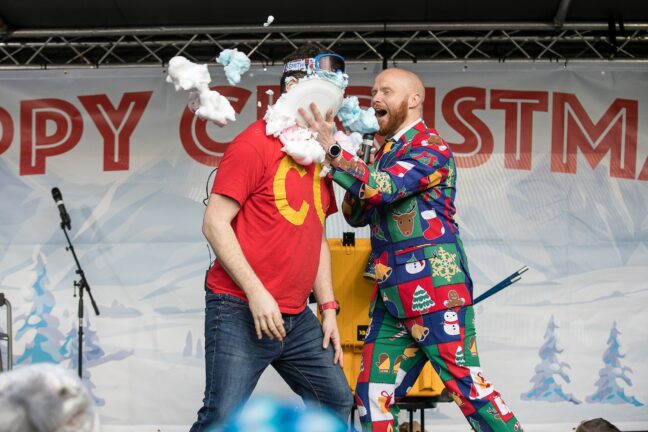
If your goal is to get into this industry, first of all, you’ve got to have a passion, you’ve got to enjoy people. You’ve got to want to give people something different, to show them your creativity, to show them that you care. I think that’s what gets your name out there. That’s my biggest tip, I think, among a few others!
But why listen to me? Before I share my tips on how to be successful as an event photographer, let me tell you a little about my own journey.
Essential Tips for Event Photography Success:
When you buy through links on our site, we may earn a commission at no cost to you. We evaluate products independently. Commissions do not affect our evaluations.
How I Got Started as an Event Photographer
I’m Paul Fox of Event Capture, a professional event photography company in the UK. I think photography is in my blood. I have a family history of photography; my granddad’s brother was a very successful photographer who worked for the Daily Express and Daily Herald as a war photographer. Then he went on to sports, shooting the Tour de France. He won a gold bike for the best photos of the Tour de France. And then he went on to the law courts of the English Justice and photographed a lot of the big court cases back in the day.
Maybe because of that, I have always had an interest in photography. I always liked looking at pictures and I always dabbled a little in taking them myself. I never really had a decent camera though, so when my daughter was born, I bought one and took a couple of pictures of her and everyone was like, “Wow, these are really good!”
Hence, I started taking photography a bit more seriously and took a few courses. I then got a few jobs where people asked me can I do this, can I do that? Can I do weddings, can I do portraits? I built a little studio in my old house, which I eventually transformed into a nice-sized studio and it sort of grew from there and more and more people employed me.
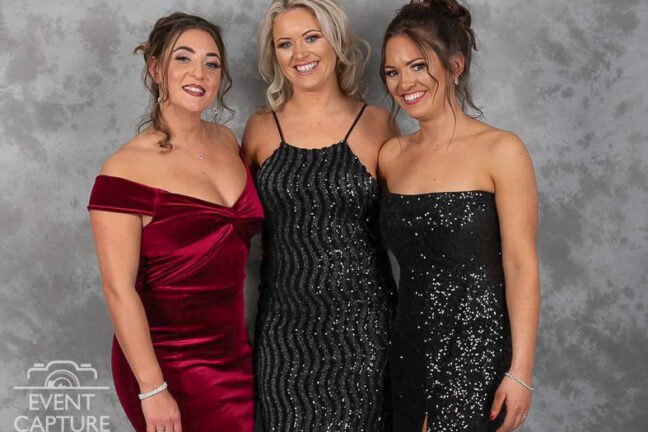
Even before becoming a full-time event photographer, I had my own company. I had a print and design business with a business partner, with 10 to 15 staff over a period of 12 to 13 years. We used to print some of my early photos. And I had stuff published in newspaper articles.
But I suppose my claim to fame is I’ve been doing the Only Fools and Horses Convention for 15 years now. Only Fools and Horses is one of the most iconic comedy programs in the UK. And there’s a man called Sir David Jason, who’s one of the most esteemed actors or famous actors in the UK. I have worked with Sir David a few times now and he is lovely, as is the rest of the cast.
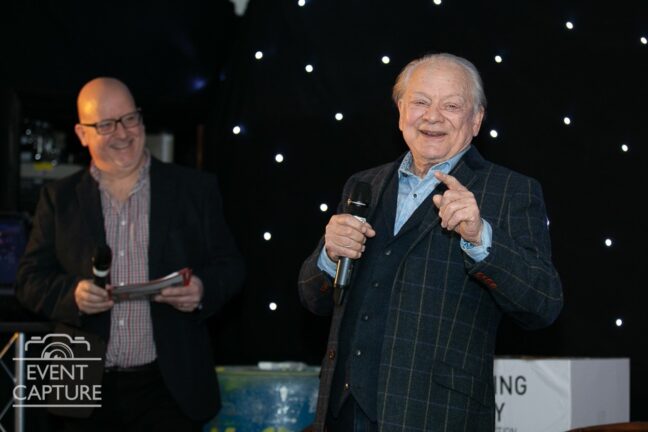
So, my photography career just sort of grew from there. It grew from a passion to trying to earn a living. We closed the print business down five or six years ago, and that’s when I said to myself, “Why don’t you go and do full-time photography?” But I can’t deny I was also asking myself, “Am I good enough? Can I do it?” I’ve talked to a lot of photographers, we’ve all got issues with self-belief, about whether we can do it, whether we’ll be good enough.
I forced myself to really look at my work. You know, you do one good shoot and you come back and say, “Yeah, I’ve had a great shoot!” You go out and do another one; is it great? Over time, I was able to say, “Yeah, I am a good photographer. I do know what I’m doing.”
For me to say I am good takes a lot. But it’s about having that confidence. I’m not the best photographer, but I’m a decent photographer and I’ll do a good job and I’ll take good photos. People come up to me now, they thank me, they employ me. They post my pictures on their walls, they print my pictures. That to me is payment.
And now, my tips to succeed in this business…
Essential Gear for Event Photography
To succeed as an event photographer, you’ll need reliable gear that can handle challenging conditions. Here’s my recommended kit:
- Two camera bodies (for backup and quick lens switching)
- 24-70mm f/2.8 lens (primary workhorse for events)
- 70-200mm f/2.8 lens (for ceremonies and stage shots)
- Fast prime lens (35mm or 50mm f/1.8 for low light)
- External flash with diffuser
- Spare batteries and memory cards
- Comfortable camera strap or harness
- Portable LED light (for extreme low-light situations)
Recommended Camera Settings
For most events, I recommend these starting settings:
- Aperture Priority mode (f/2.8 – f/4 for groups)
- ISO 800-3200 (depending on lighting)
- Minimum shutter speed 1/125s
- Auto White Balance with RAW shooting
- Continuous AF with back-button focus
- Burst mode for key moments
Always Be Open to Learn New Things
I still feel like I’m learning every day. And I think it’s good to have that constant learning, especially doing it full-time now. You learn so much by shooting. It’s like anything, the more you do it, the better you get.
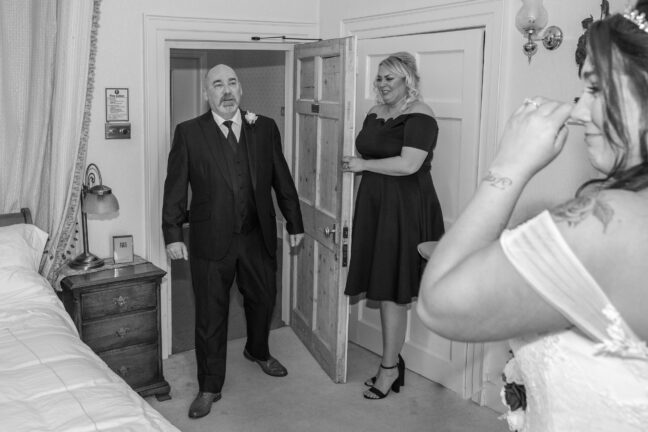
With event photography, you’re always going to have different situations. Wedding photography is very different from say, concert photography. A friend of mine said to me once, I’m not a photographer, I’m a problem solver.
You know, you could go to shoot a wedding and it could be chucking it down with rain, or the bride has split her dress, or I’ve had it where the bride and her mother had a row five minutes before the wedding and the mum didn’t want to be in any of the wedding photos. So you’re trying to be the peacemaker. I’ve been at a wedding where I’ve had to sew a button on.
You’re not just a photographer. And you’re always learning. Different situations, different lighting. It’s not like headshot photography where you have controlled light. There are your lights, there’s your backdrop, away you go. Event photography is always changing. And I think if you’re shooting more and you’re not learning, then I’d get out of the game.
Have the Right Attitude
As a person, I get on with people, I like people. And I like to capture people. Hopefully, I can make people laugh. I like to have a bit of banter and I think that brings out the best in people.
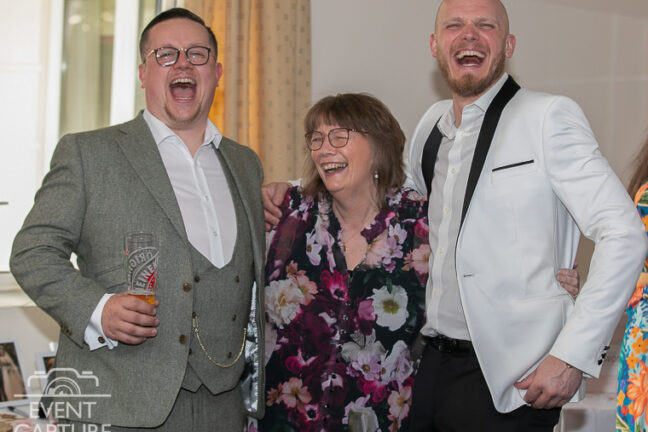
You do see event photographers stand there in a corner with a 70 to 200 lens and shoot all night; that’s not me. I will go up to people and say, “Come on, let’s have a photo, what’s the matter with you?” I’ll make jokes, like when someone says, “Can you make me look two stone lighter?” I’ll say, “Sorry, it’s a camera, not a wand!” There are all sorts of jokes. But I’m also respectful. If someone says they don’t want their photo taken, I leave them alone. Some people just don’t like having their photo taken.
It’s about being polite. It’s about being honest. And I think, you want to blend in with that. I also think, from a work point of view, it’s less editing. It’s minimalist. In the very first course I ever did, the guy said to me, “It’s like a car. You can either spend hours under the bonnet, putting it right – by editing in Photoshop or Lightroom or whatever you use, or you can look after your car and get it right in camera.” I try and get it right in camera.
I just like it when I put a group of photos together and I get a nice reply back from the people. Because it is all about memories. I always say this, and you’ve most likely heard it hundreds of times: people think photos are not important, but when they’re the only thing you’ve got left, then that’s when they’re important.
Build a Diverse Portfolio
I started out shooting a lot of weddings, and you’ll no doubt go down that route too. But I don’t do a lot of weddings these days. I feel they are a young person’s sport, to be honest! I enjoy doing family parties. I enjoy corporate events, networking events. Anywhere I would say the pressure’s off a little bit.
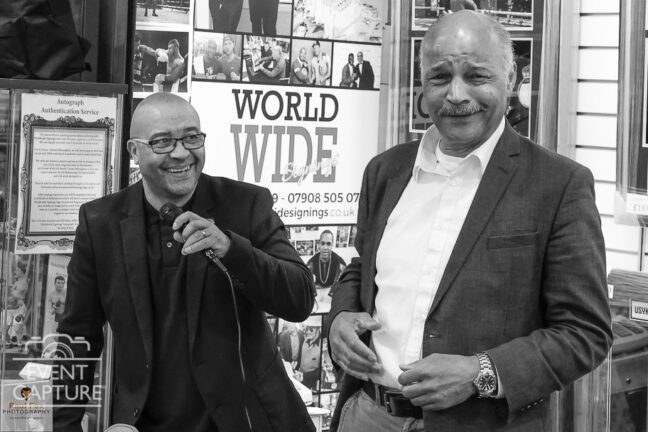
Presentations can be a little bit difficult because people don’t understand that they’ve got to stand in the middle of the stage, you’ve got to pose them. They don’t think about me getting a photo, they just think I can automatically get a great photo when they’re standing in the shadow. Or again, that I can fix it in Photoshop. But with Photoshop, you can only do so much.
I enjoy events where people are mingling, having a good time, and making memories. Nightclubs and stuff, not really, but I enjoy sports. I love boxing. I’m a big boxing fan and I’ve shot a couple of world title fights. That was weird, doing the photography for world title fights at iconic venues. You look at all these other photos of the same event and you think, I’ve shot two and a half thousand photos and I’ve got maybe one or two where the glove’s landed on the cheek or you’ve caught them with a body shot.
Related Posts
Every other photographer there has got exactly the same. These professional boxers are so fast; they hit so hard. So yeah, the other photographers there might shoot two, two and a half thousand photos too, and they’re only going to get half a dozen they can use. Because to get that punch where it connects, or the sweat coming off their face, or their mouth open, it’s just a matter of shooting as much as possible. They’ll only post one or two. But that’s the luck of the draw. Sometimes you’ve got to be lucky.
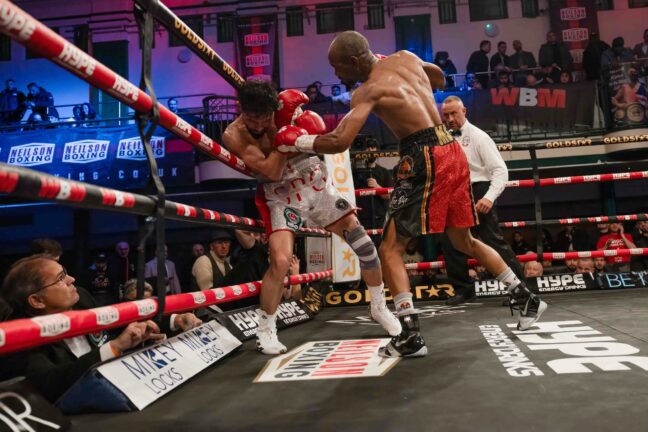
Position Is Everything
You can’t leave it all down to luck though. You’ve got to be in the right place to get the good shots. If I’m shooting a concert, for example, I do my best to make sure I’m towards the front. It’s like taking a photo wherever. If you go to New York for argument’s sake, and you want to take a picture of the Empire State Building, you’ve got to be in the right position to get that shot.
As a prime example, when I did the boxing world title fight, the photographers got one side of the ring. It was a big fight and we were all jostling for that one position. You’ve got to literally get your spot and stay there because if you move, you go to the toilet, you get a drink, whatever, someone’s going to take your spot. You get your spot and you’re there for the rest of the night.
I’ll never forget this one. I did a massive bar mitzvah, a high-end bar mitzvah, and it was in a big venue and they had this staircase with two entrances that you could go up and come down. And the organisers said to me, “We’ve got these dancers coming down; they’re going to walk the young man down and they’re coming from this side.” So I’m over there set up and they make a last-minute change and the dancers come down the other side. What do you do?
I had to go up to them and ask them to do it again. To be fair, the event organiser held their hands up and said, “It was my fault.” So we sort of did it again – not in the euphoric way that it should have been but just to get that shot!
Position is everything. So before the event, if you can, try to get familiar with the venue and where you’ll be working.
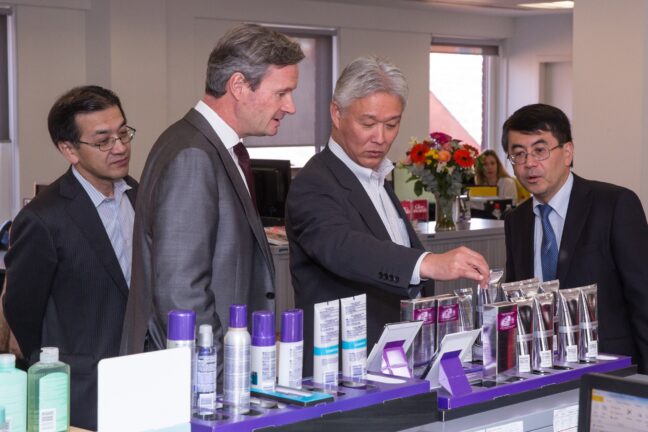
Working with Event Organizers
Before every event, I always go in and introduce myself to the event organiser, or the party planner, or the venue manager. I say, “Hi, this is my card if you need it. Or let me know if I’m in the way or I’m doing something I shouldn’t be doing. Is there anything I need to know? Are there any areas where I can’t go? Am I allowed to use flash? Am I allowed to photograph this area?”
I ask them if I can have a press pass. Bit of schmoozing. It’s always good to be polite and nice to people because you never know when you’re going to need them. You learn that as you go along. It’s just common decency. Doing the right thing pays dividends.
You do get some event planners and organisers that can be a little bit off with you and think, oh, you’re just a photographer, but you can ignore that by thinking this is all just a bit of networking. You can pay thousands of pounds to go to high-end networking meetings, whatever. Do your own networking. Something I learned is that when you’re working, work hard, be the best person you can be, be the most polite person you can be. That’s where you get your recommendations.
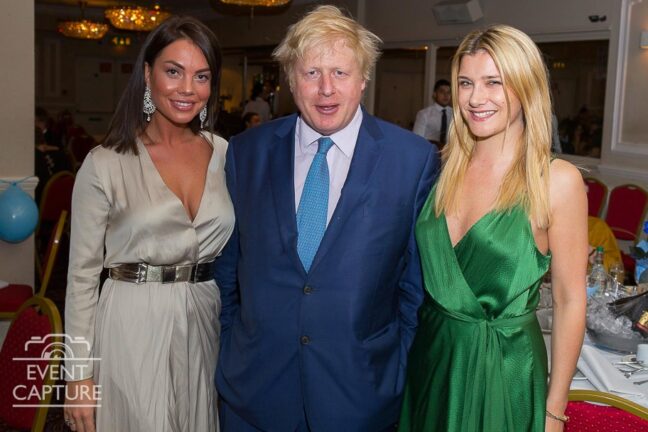
A couple of Sundays ago, I shot a presentation event for a ladies’ football team. They’re the biggest ladies’ football team in London, with over 400 girls. I’ve had two inquiries to photograph other football teams already, which is great. I’ve not spent any money. People have just seen how hard I work and the service I give. Just be your own hero in that in that respect. You want to try to have people on your side, who have your back.
I just try and win people over. And I think you get more out of people when you’re nice to them. They’ll want to do things for you, they’ll want to give you more information, and they’ll want to introduce you.
My granddad used to say, and I never forget, “You never know who you’re going to meet at the bus stop.”
You never know who you’re going to talk to – they could be a window cleaner, they could be a managing director of a multi-billion pound company. Treat them exactly the same. I don’t know you. I don’t care who you are, but you go to work, you bleed the same colour as me, you eat the same food as me. It’s a great lesson.
Pricing and Business Tips
Success in event photography isn’t just about taking great photos. Here are some business essentials:
- Start with competitive hourly rates (£150-300/hour in the UK)
- Always use contracts and get deposits
- Carry professional insurance
- Set clear delivery timeframes (usually 48-72 hours)
- Build relationships with venues and event planners
- Create packages that include digital delivery and printing options
- Consider offering same-day preview images for social media
